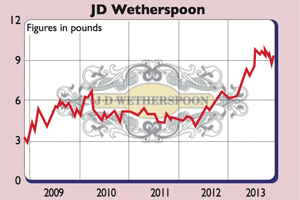Shares in focus: The pub chain that’s bucking the trend
JD Wetherspoon has been growing fast. Can it keep going, and should you buy in? Phil Oakley investigates.
Get the latest financial news, insights and expert analysis from our award-winning MoneyWeek team, to help you understand what really matters when it comes to your finances.
You are now subscribed
Your newsletter sign-up was successful
Want to add more newsletters?

Twice daily
MoneyWeek
Get the latest financial news, insights and expert analysis from our award-winning MoneyWeek team, to help you understand what really matters when it comes to your finances.

Four times a week
Look After My Bills
Sign up to our free money-saving newsletter, filled with the latest news and expert advice to help you find the best tips and deals for managing your bills. Start saving today!
JD Wetherspoon has been growing fast, but can it keep on going, wonders Phil Oakley.
Tim Martin studied law at university and qualified as a barrister, but he soon decided that pubs and beer were more interesting. So in 1979 he bought a pub in Muswell Hill, north London, that became the first one in his JD Wetherspoon empire.
The name was taken from the character of JD Hogg from The Dukes of Hazzard TV series and Mr Wetherspoon, one of Martin's school teachers.
MoneyWeek
Subscribe to MoneyWeek today and get your first six magazine issues absolutely FREE

Sign up to Money Morning
Don't miss the latest investment and personal finances news, market analysis, plus money-saving tips with our free twice-daily newsletter
Don't miss the latest investment and personal finances news, market analysis, plus money-saving tips with our free twice-daily newsletter
The history
Martin would like Wetherspoon's to keep on getting bigger. Although it's tough making money from pubs, Wetherspoon's has been quite good at doing so. However, with the shares up 36% this year, is it too late to jump on board, or is there still more to go for?
How the business has fared
However, no matter how bad a particular market can be, you'll often find that there are companies that can still do well. In pubs, Greene King (LSE: GNK) is one of them and Wetherspoon's is another.
After seeing many big towns and cities become saturated with pubs and bars, Wetherspoon's has successfully set up in smaller towns. This may not have endeared it to some of its local competitors, who have accused it of being the Tesco of the pub world, screwing down prices and putting them out of business. But on the whole they seem to have gone down well with local punters.
Going for growth
Bears of the company's shares point out that profit margins have been trending lower over the last few years. That's true, but the extra sales have been good enough to make Wetherspoon's returns on the cash it has invested hold up fairly well and justify the money spent. The company is also investing for the long term and is absorbing some cost increases instead of passing them on to customers in order to generate goodwill.
The founder's view
He argues that pubs have to charge VAT at 20% on the food that they sell, but supermarkets do not. This allows them to sell alcohol at cheaper prices and makes it a lot more attractive for people to stay at home and drink rather than go to the pub. Until there is a level playing field it is still going to be hard for pubs to thrive.
This is probably true in general, but people can take comfort from Wetherspoon's track record of adapting to the changing competitive and regulatory landscape. The failure of weaker pubs has also allowed it to buy in some good locations at good prices.
While Wetherspoon's has a reasonable amount of debt, it should not be compared with the likes of Enterprise Inns and Punch Taverns, which have been struggling with big debts since the financial crisis. Wetherspoon's is not a leveraged play on property prices that can go wrong, but a pub business that it looking to grow.
Should you buy the shares?
Wetherspoon's looks well placed to keep growing. Its track record means that the shares are not cheap, but they are still trading at a reasonable price for long-term investors.
Verdict: long-term buy
JD Wetherspoon (LSE: JDW)


Directors' shareholdings
Get the latest financial news, insights and expert analysis from our award-winning MoneyWeek team, to help you understand what really matters when it comes to your finances.
Phil spent 13 years as an investment analyst for both stockbroking and fund management companies.
-
 Average UK house price reaches £300,000 for first time, Halifax says
Average UK house price reaches £300,000 for first time, Halifax saysWhile the average house price has topped £300k, regional disparities still remain, Halifax finds.
-
 Barings Emerging Europe trust bounces back from Russia woes
Barings Emerging Europe trust bounces back from Russia woesBarings Emerging Europe trust has added the Middle East and Africa to its mandate, delivering a strong recovery, says Max King